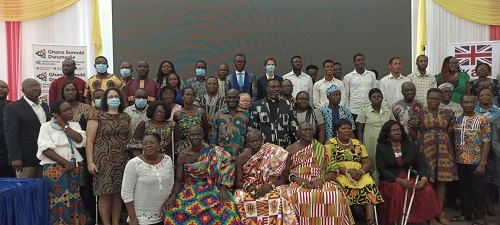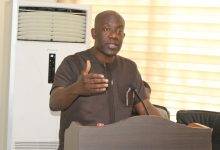
The government has been urged to urgently generate reliable data on persons with disabilities and the mentally challenged to aid their proper targeting in emergency response.
The Commissioner of the Commission on Human Rights and Administrative Justice (CHRAJ), Mr Joseph Whittal, said the present situation where data on such individuals were segregated deepened inequalities and their vulnerability during public health emergencies.
“For me, our motto on the Coat of Arms – Freedom and Justice – will continue to be mere rhetoric and sound hollow if we continue to neglect and do not prioritise issues of disability and mental conditions in our midst.
We must ensure that these groups are considered first in our development prioritising, programming, targeting and budgeting,” he urged.
The Commissioner made the call at the screening of six short films on COVID-19 Psychosocial Resilience Grants awarded by Ghana Somubi Dwumadie (Ghana Participation Programme), a four-year disability programme in Ghana, with a specific focus on mental health.
Funded by the UKAid, the programme in October 2020, awarded seven grantee institutions a total amount of GH¢1,193,574 to implement COVID-19 related activities across Ghana for a period of 12 months.
The films, therefore highlighted interventions made in reducing the impact of COVID-19 on PWDs and persons with mental health and their contributions towards response measures.
Mr Whittal, describing Ghana’s inequality gap as a “matter of national security,” urged government to sustain investment in mental health and uphold the protection of the fundamental rights and freedoms of PWDs and the mentally challenged.
A Representative of the Foreign, Commonwealth and Development Office (FCDO), Ms Susan Mensah, said the fact that 10 per cent of Ghana’s 31 million population suffered mental health conditions and one-fifth were estimated to have disabilities, called for continued prioritisation of mental health resourcing in Ghana.
“The investment case for mental health services is compelling. It is estimated that nearly seven per cent of GDP is lost due to psychological distress compared to four per cent lost to malaria.
The return on investment through investing one cedi in mental health services can be potentially up to 14 cedis,” she said.
Having invested up to £39million in the last five years to deliver services to the poorest and marginalised in Ghana, Ms Mensah said, the FCDO was committed to the goal of ensuring that “they enjoy good health and wellbeing and that they are empowered and able to enjoy improved social and economic standards.”
Team Leader on the Ghana Somubi Dwumadie, Lyla Adwan-Kamara highlighted key focus areas of the programme including increasing access to mental health support, addressing stigma and discrimination against PWDs and people with mental health disabilities.
“Since its inception in 2020, Ghana Somubi Dwumadie has focused on enabling people with disabilities including people with mental health conditions to use their own voices to access their rights and we are delighted such strong voices are emerging to lead and bring change to their communities,” she stated.
BY ABIGAIL ANNOH







